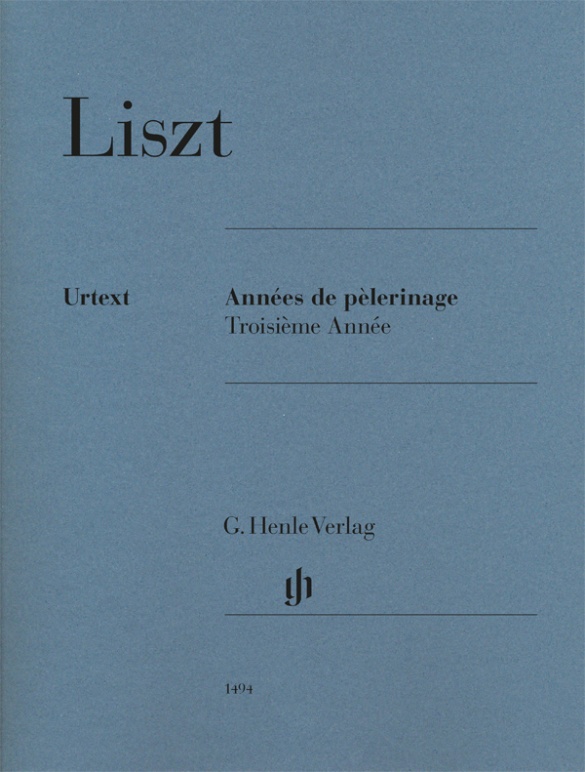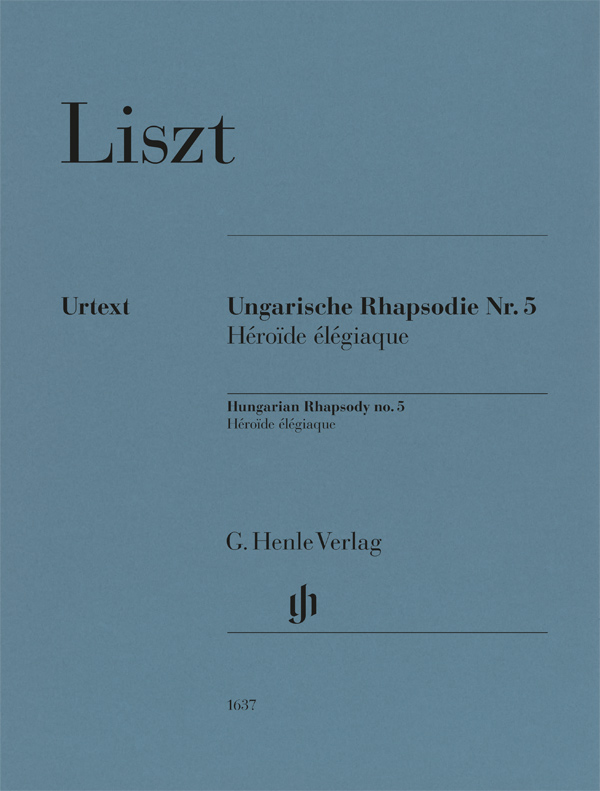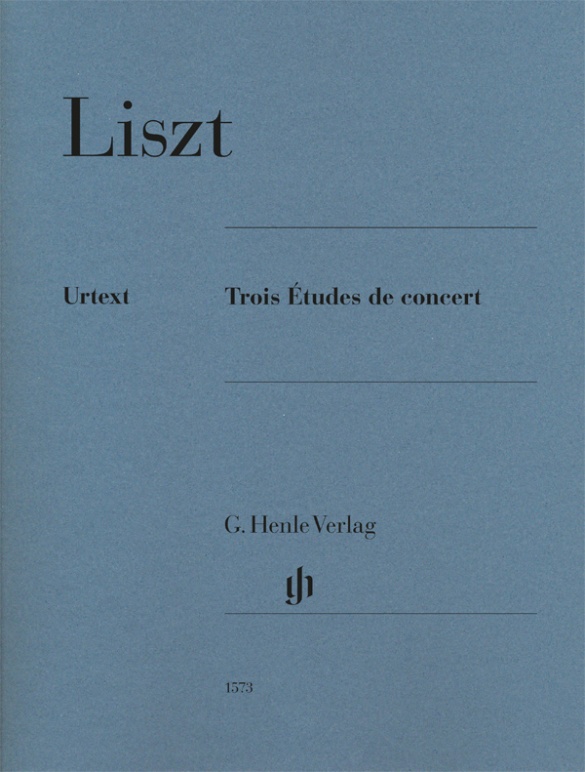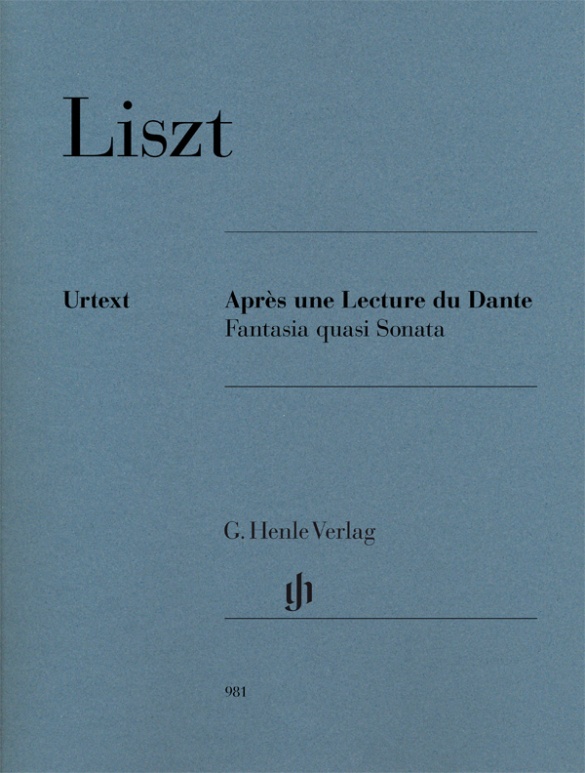

Franz Liszt
Après une Lecture du Dante - Fantasia quasi Sonata
Volontiers désignée en tant que «Sonate de Dante» par les pianistes, la pièce finale du volume II des «Années de Pèlerinage» (HN 174) est enfin disponible séparément. En 1839, sous l’impression de la «Divine Comédie» de Dante, Liszt avait commencé à travailler sur un «fragment dantesque». Plus tard il joint l’œuvre après révision au volume «Italie» de ses «Années de Pèlerinage».
La Sonate en un mouvement se rattache à la section «Enfer» du poème de Dante. Elle décrit de façon saisissante la chevauchée sauvage de l’âme dans sa descente en enfer, qui se termine dans une sorte de transfiguration sur quelques accords réconfortants – démonstration par excellence du raffinement technique et de la culture sonore de Liszt.
CONTENU/DÉTAILS
(Explanation)
CONCERNANT LE COMPOSITEUR
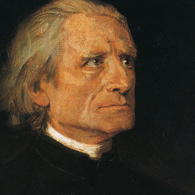
Franz Liszt
Le célèbre virtuose du piano du XIXe s. est considéré comme l’une des figures d’artiste et de compositeur les plus influentes de ce que l’on appelle la Nouvelle École allemande (avec Berlioz et Wagner). Son immense œuvre musicale comprend au premier plan des œuvres pour piano seul, parmi lesquelles de nombreuses transcriptions; il développe en outre le poème dit symphonique. Ses œuvres chorales sacrées et profanes ainsi que ses mélodies sont tout aussi importantes.
| 1811 | Né le 22 octobre à Doborján (auj. Raiding en Autriche), fils d’un fonctionnaire au service du prince Esterházy. Premiers cours de piano auprès de son père, premiers essais de composition, première audition publique à l’âge de 9 ans. |
| 1822 | La famille s’installe à Vienne. Suit les cours de Carl Czerny et d’Antonio Salieri. |
| 1823 | La famille s’installe à Paris. Cours de composition chez Ferdinando Paër et Antonín Reicha (1826). Se produit dans des salons, concerts. |
| 1824–27 | Tournées de concert en France, en Angleterre et en Suisse. Composition de paraphrases d’opéras pour piano. |
| 1830 | Rencontre avec Berlioz, lectures et études. Il devient l’un des pianistes et professeurs de piano les plus appréciés de la société parisienne. |
| 1835 | Il s’installe en Suisse avec la comtesse Marie d’Agoult. C’est là que naît Blandine-Rachel leur premier enfant. Par ailleurs, il continue à donner des concerts à Paris. |
| à partir de 1839 | Incessantes tournées de concert à travers toute l’Europe. |
| à partir de 1847 | Poèmes symphoniques, entre autres n° 2 «Tasso: lamento e trionfo», n° 1 «Ce qu‘on entend sur la montagne», «Faust-Symphonie», «Dante-Symphonie» ainsi que «La Bataille des Huns» [n° 11]. |
| 1848–61 | Maître de chapelle à Weimar; il s’engage pour la musique «progressiste» (Wagner, Schumann, Berlioz). |
| 1857–62 | Oratorio «La Légende de sainte Élisabeth». |
| 1861–68 | Séjour à Rome. |
| 1865 | Reçoit les Ordres mineurs. |
| 1866–72 | Oratorio «Christus». |
| 1871 | |
| Nommé conseiller à la cour de Hongrie; il vit à Rome, Weimar et Budapest. | 1886 |
About the Authors

Ernst Herttrich (Editeur)
Dr. Ernst Herttrich, born in 1942 in Würzburg, read musicology, history, German and theology at the universities in Würzburg and Cologne. In 1970 he earned his doctorate in Würzburg with a study of the expression of melancholy in the music of Mozart.
From 1970 to 1990 he was an editor at G. Henle Publishers in Munich, after which he was Head of the Beethoven Complete Edition for over 15 years. In 1999 he took over as Head of the Beethoven-Haus Publishers, and from 2001 was made Head of the Beethoven-Archiv, the research centre at the Beethoven-Haus.
He has been a visiting professor at Meiji Gakuin University in Tokyo and has undertaken several lecture tours both there and to Kyoto. His research interests include source studies, editorial techniques and music history. Herttrich’s publications include “Beethoven. Liederkreis an die ferne Geliebte” (Bonn 1999) and “Ludwig van Beethoven. Biographie in Bildern” (Bonn, 2000). Herttrich has edited over 100 Urtext editions for G. Henle Publishers.
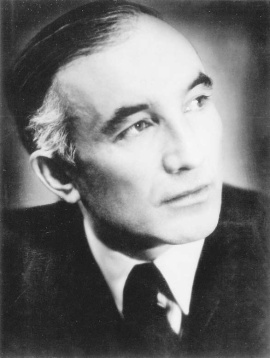
Hans-Martin Theopold (Doigtés)
Prof. Hans-Martin Theopold, was born to a pastor’s family in Detmold on 22 April 1904, the youngest of five children. Even as a child he often played the organ in the “Marktkirche” and soon began to take piano lessons with Theodor Vehmeier. At the age of 17 he made his debut at the Landestheater in Detmold with Ludwig van Beethoven’s Piano Concerto in C major under Friedrich Quast (Herford). Following the successful completion of his schooling at the Gymnasium Leopoldinum in Detmold, he went on to study music and piano (main subject): from 1922–23 at the “Württembergische Hochschule für Musik” in Stuttgart (with Max Pauer, 1866–1945) and then from 1923–1928 at the “Staatliche Akademische Hochschule für Musik” in Berlin-Charlottenburg (with Richard Rössler, 1880–1962, and Waldemar Lütschg, 1877–1948). After completing his piano studies (graduating with “very good”) in 1928, he began an active solo career both at home and abroad (USA, Switzerland, Scandinavia, the Baltic states, the Balkans). As a member of the Chamber Music Association of the State Opera in Berlin (from 1933) he also gave countless chamber music concerts, including ones with his violin partner Gustav Havemann (1882–1960).
In the 1930s, audiences and the press alike raved about Theopold’s extraordinary gifts as a pianist: “This young player has it in him to soon become one of the best players in Germany. A superior technique, a wonderful singing piano tone, the strength of a Titan, but not at all hard due to the incomparably gentle elasticity of his touch” [Münchener Zeitung, 21 November 1933]. – “H.M. Theopold gave convincing proof of his splendid pianistic ability in an extremely gripping sonata with a modern idiom by Alban Berg, but predominantly in Schubert’s […] Wanderer Fantasy, which he played with a polished technique and creative power” [Weser-Zeitung, 21 December 1932]. Theopold was awarded several prizes, including the “Grotrian-Steinweg-Preis” in 1928.
In 1937 Theopold became a teacher for the piano (main subject) at the “Bayerisches Staatskonservatorium der Musik” in Würzburg. In 1939 he married Irene Tatjana Wülfing, who was from Moscow. From 1943 he became head of the piano master-class at the “Nordische Musikschule” in Bremen, although this was interrupted by the events of the war. Following his return from a prisoner of war camp, Theopold gave concerts and taught although he did not hold a permanent position. From 1955–1956 he was acting head of the piano master-class at the “Bergisches Landeskonservatorium” in Wuppertal, finally being appointed Professor for Piano on 1 April 1956 at the “Staatliches Institut für Schul- und Volksmusik” in Detmold, later at the “Nordwestdeutsche Musikakademie Detmold” (today “Hochschule für Musik Detmold”), where he taught for decades. On 30 September 1969 he retired. “His students extol his pedagogical gifts. […] Humour, charm, helpfulness and kind-heartedness moderate the strictness of his professional ethos as a musician and teacher” (Lippische Rundschau, 23 April 1969; see also: Lippische Landeszeitung 22 April 1969 on the occasion of Theopold’s 65. birthday: “Prof. Theopold, a modest but at the same time energetic man, is an enthusiastic teacher”). Theopold died in Detmold in 2000.
Contact with Günter Henle was established directly after the publishing house was founded, when Theopold thanked the publishers with great enthusiasm for its first Urtext editions. His extensive correspondence with the publishing house was bequeathed to the Lippische Landesbibliothek in 2014 to ensure its long-term accessibility to the public. The letters testify not only to Theopold’s great interest in musical sources and text questions but also to his initial strict refusal (!) of fingerings in text-critical editions such as these: “For fingerings are and remain something individual no matter what their quality” (letter to Günter Henle from 26 May 1949 {publishing house archives}). Günter Henle was not, however, to be swayed and stressed the necessity of fingerings in his Urtext editions: “It is better to publish the Urtext […] with fingerings that are not necessary for a few individuals, or that might even, I admit, be considered irritating here and there” (letter to Hans-Martin Theopold of 17 September 1953).
It was only in 1955 that Theopold accepted Günter Henle’s offer of contributing fingerings for an Urtext edition that was in the process of being prepared by way of trial. (HN 74, Schubert, Complete Dances for Piano, Volume 1). Following this, Theopold was commissioned to write the fingerings for nearly all of the publishing house’s new editions in quick succession. Günter Henle, himself a good pianist, greatly valued Theopold’s fingerings, and also the many suggestions regarding the musical text in question. In addition, Theopold was always very reliable, thorough and conscientious – something that is not unimportant with editorial work!
Thus to date Hans-Martin Theopold has provided the fingerings for the greatest number of Henle Urtext editions by far – 226 editions (!) in total.
We would like to thank Mrs Margot Theopold and the Hochschule für Musik in Detmold for their great support in providing biographical material.
G. Henle Verlag
Informations sur la sécurité du produit

G. Henle Verlag
Vous trouverez ici des informations sur le fabricant du produit.G. Henle Verlag e.K.
Forstenrieder Allee 122
81476 München
Allemagne
info@henle.de
www.henle.com
Het stuk heeft heel veel noten, is echt voor de gevorderde pianist, en is voortreffelijk uitgegeven.
Piano Wereld, 2011recommandations
autogenerated_cross_selling
Autres éditions de ce titre
Autres éditions de ce titre


